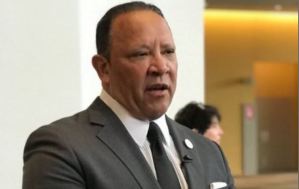
By the Houston Defender
When legendary hip hop artist DMX — born Earl Simmons — died last year from a massive heart attack, a fight began over his extensive rap catalog. Despite selling more than 74 million albums and enjoying a wildly successful career in both music and movies, DMX died without a will. So multiple members of his family, which includes 15 children, petitioned the court seeking to become administrators of the late rap star’s estate.
With so much wealth at stake and so many children, DMX’s failure to create an estate plan will likely mean his loved ones will be stuck battling each other in court for years to come. And perhaps no one stands to suffer more than DMX’s fiancée, Desiree Lindstrom.
DMX and Lindstrom, who were engaged in 2019, had been together for seven years, and she gave birth to his 15th child in 2016. However, because the two were never married and DMX did not create a will or any estate planning providing for her, Lindstrom will likely inherit nothing from her late fiancee’s fortune.
A common problem
While DMX’s case is tragic, the lack of estate planning and leaving a will is all too common among celebrities — Chadwick Boseman, Prince, Jimi Hendrix, Tupac Shakur and Bob Marley all died without a will.
“Queen of Soul,” Aretha Franklin, who died in 2018, left behind four different handwritten wills, and more than four years after her death, her four adult sons are still fighting each other in court over her estate.
If celebrities, with extensive portfolios don’t have wills, many say it’s no surprise that regular Americans don’t have one either. According to a recent study from Consumer Reports, more than 70 percent of Black Americans don’t have a will. That disturbing statistic has not only led to relentless drama and potential discord in afterlife planning, but if there’s any money involved, it could be a recipe for disaster.
“A lot of people think they need to be rich in order to do a will,” said estate planner Sherwood Brown. “But a will can protect everything from who will get your house to who can go get your $12 out the bank. It also removes the lack of clarity around your wishes and drama among family members. Everyone over the age of 18 should have a last will and testament.”
Experts say having a will can ensure everything you own gets to the people you choose, without adding the burden of legal challenges to the emotional burden of losing you.
“Some people don’t think they have enough assets, especially if they didn’t own property,” as in a home or other real estate, to pass on, says Rasheda Williams, whose grandmother, uncle, mother and brother died recently without wills and has gone through the probate process, a formal legal process for distributing assets to beneficiaries. “Vehicles, family keepsakes and other items should be willed,” she learned.
Williams says the probate process she went through when her grandmother died took seven months and cost her $700 because her grandmother didn’t have updated bank account beneficiaries, people designated to receive the funds when she died. Williams was designated as a beneficiary on two insurance policies, however, which made the process easier, she says.
And if you die without a will and your family doesn’t have the “typical” mom, dad and kids nuclear family structure, it could be more likely that your assets won’t go where you want them to go, says Marty Shenkman, a lawyer and board member of the National Association of Estate Planners and Councils.
A will can help ensure that anything you own gets passed on precisely as you want, not as the state thinks you’d want.
Here are 10 reasons why you need to do your will today:
1. Eliminate the courts. Almost all estates have to go to probate court to start the legal process overseeing the distribution of assets. But without a will, the court process can get especially complicated. They have to name an administrator over your estate, which can be time-consuming, expensive and even contentious for your loved ones. A will streamlines this court process. When you have a will, you can choose the person you want to handle your estate, making it easier for your loved ones.
2. Determine who will manage your estate. This is the person who will be in charge of wrapping up all your affairs. Being an executor is an important job. Their responsibilities may include everything from closing bank accounts to liquidating assets. So you should choose someone who is capable and who you trust to carry out these activities. If you don’t choose an executor in your will, the court will pick one for you — and it may not be the person you’d want.
3. Decide who gets what. Most people know that a will lets them decide who will get their property. As the testator, you can name people as beneficiaries for specific assets. You can also name beneficiaries for any property that you don’t list — the “residuary” of your estate. When your executor handles your will, they’ll be in charge of distributing these assets. You might not be aware that you can also use a will to help ensure that some people don’t receive anything. For example, you might want to prevent an ex-spouse from receiving an inheritance. Or, if one child received your support through school, you might want to make sure a second child gets their fair share, too.
4. Choose who will take care of your minor children. If you’re a parent, you can use your will to nominate a guardian for your minor children. The surviving parent will usually get sole legal custody if one parent dies. But if both parents pass, this is one of the most important reasons to have a will. A guardian will be responsible for all your children’s daily needs, including food, housing, health care, education and clothing. And if you don’t nominate a guardian in your will, a court will have to choose one for you. This could mean that someone you would not have chosen will be raising your kids.
5. Provide a home for your pets. The law considers pets to be property, so you can’t leave any assets to your pet with your will. But you can name a beneficiary for your pet, leaving them to a trusted friend or family member. You can ask that person to act as a caretaker or guardian for your pet, and even leave them funds to provide for your pet’s care.
6. Leave instructions for your digital assets. In your will, you can name a digital executor to manage your online accounts, such as Facebook or email, and digital files or property (photos, videos, domain names, etc) after you pass. You can leave them to specific people, and also include information on how you want them handled (e.g. if you’d like an account closed).
7. Lower the potential for family disputes. If you have complicated family dynamics, there’s a good reason to have a will. When you die without a will, your family will have to guess at what your final wishes were. And chances are, they won’t always agree. This ambiguity can create friction, and even fights, which sometimes lasts a lifetime. Creating a will solves the problem by eliminating the guesswork. Missing a family member will be hard enough. Imagine adding to that stress the need to handle legal issues and probate court because you didn’t leave clear instructions for what to do with assets, and in some cases children, out of fear of talking about death
8. Support your favorite causes and leave a legacy. Many people want to leave a positive impact on the world after they pass. And a great way to do this is to support the charities or causes you love most. When you write a will, you can preserve your legacy by leaving a part of your estate to a charitable organization.
9. Provide funeral instructions. You may not want to think about your own funeral. But if you do think about it now, and leave instructions with your will, you can lessen the burden on your loved ones after you pass. While these instructions aren’t legally binding, they can give your executors and loved ones some guidance on your wishes. When you include instructions, you can name a funeral executor to manage the process, give suggestions for the service and location, make requests for your final resting place and more.
10. Gain peace of mind. Some folks put off creating or updating their will because they assume their loved ones will automatically get an inheritance. But this isn’t always true. Probate can be a long and expensive process for your heirs. Plus, a will only addresses your current circumstances. You should update it over time as your needs and the people in your life change.
What else you need
In addition to a last will and testament, here are some other documents that can help in afterlife planning.
- Durable power of attorney: This document lays out who can make financial decisions for you in the event you are incapacitated.
- Healthcare power of attorney: This designates someone to handle your medical decisions if you become sick and can’t make them for yourself.
- Living will: Also called an advanced directive, a living will is a document that expresses your wishes for medical treatments you would or would not want to use to keep you alive, like resuscitation and intubation.
Resources
Writing your own will can be as cheap as using a template found online and having it notarized.
Visit FreeWills.com for a template.
This article was originally published by the Defender Network.
The post Black people, estate planning and wills: the push to financially plan for life after death appeared first on AFRO American Newspapers .










